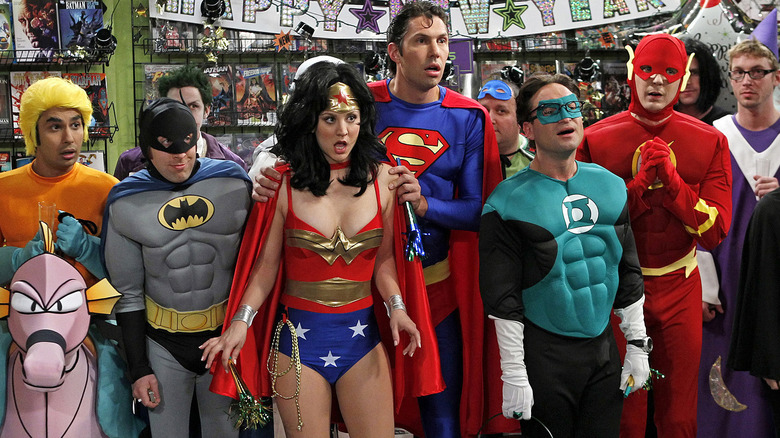In recent years, nerd culture has transformed from a niche subculture into a dominant force in mainstream entertainment. At the heart of this cultural revolution are superheroes—once confined to the pages of comic books and the imaginations of die-hard fans, now front and center in blockbuster films, hit TV shows, and an entire multi-billion-dollar industry. From the humble origins of Superman’s first flight to the global phenomenon of the Marvel Cinematic Universe, superheroes have transcended their comic book roots to become symbols of power, hope, and identity for people around the world. But how did these larger-than-life characters move from being seen as “geeky” obsessions to becoming the cultural touchstones of our time? This article will explore the rise of superhero media, examining how it captured the hearts of audiences, reshaped pop culture, and helped nerd culture claim its rightful place in the mainstream.
The Origins of Nerd Culture
Nerd culture, as we know it today, has its roots in the early 20th century, shaped by the rise of comic books, science fiction, fantasy literature, and later, video games. Initially, those who embraced these hobbies were often seen as outsiders, far removed from the mainstream. Comic books, with characters like Superman, Batman, and Captain America, became some of the earliest forms of nerd culture in the 1930s and 1940s. These heroes were born out of a desire to provide readers with stories of hope, justice, and fantasy—an escape from the difficulties of everyday life.
By the mid-20th century, TV shows like Star Trek and Doctor Who began to further develop nerd culture, gaining a devoted fanbase despite not always being initially appreciated by the broader public. However, these shows, with their imaginative worlds and otherworldly adventures, were groundbreaking for their time. Meanwhile, fantasy literature, with the works of J.R.R. Tolkien and C.S. Lewis continued to inspire fans to dive deep into imaginary worlds, fueling the growth of conventions, fan clubs, and the early formation of a community based around these niche interests.
The 1980s and 1990s saw the rise of video games, anime, and role-playing games, which further broadened nerd culture. Platforms like Dungeons & Dragons became cultural touchstones, and video game consoles like the Nintendo Entertainment System (NES) connected nerds across the globe. At the same time, comic book conventions started to take off, attracting thousands of fans who shared a common love for these oft-overlooked media.
Despite the growing influence of nerd culture, it wasn’t until the early 2000s that the tides began to shift, and the world started to pay attention. The rise of the internet, online communities, and an increasingly globalized pop culture landscape played a key role in turning once “geeky” hobbies into mainstream phenomena. Today, nerd culture is not just accepted but celebrated, with superhero franchises now dominating the box office and comic book characters becoming icons of modern mythology. Even industries outside entertainment, like sports betting through platforms such as 1xbet Malaysia, have seen the infusion of nerd culture through gaming and e-sports, proving just how far nerd culture has come from its humble beginnings.
The Turning Point: Superheroes Enter Mainstream
Superheroes, once considered the domain of comic book enthusiasts and niche fans, began their journey into the mainstream in the late 20th and early 21st centuries. The turning point came when superhero stories broke out of their comic book origins and captured the imaginations of a broader, more diverse audience. While Superman and Batman had enjoyed some level of success in film and television in the 1980s and 1990s, it was the groundbreaking X-Men (2000) and Spider-Man (2002) films that set the stage for a full-blown superhero explosion.
X-Men marked a key moment in superhero history by introducing a more mature and diverse range of characters, showing that superhero stories could be both exciting and thought-provoking. The film’s success proved that superhero films were not only viable but could resonate with mainstream audiences beyond comic book fans. Following closely behind, Spider-Man was a cultural milestone, breaking box office records and cementing the superhero genre as a commercial powerhouse. The film’s appeal was amplified by its relatable hero, Peter Parker, and the emotional depth of his struggles, making the genre more accessible to a wider audience.
However, it was the arrival of the Marvel Cinematic Universe (MCU) in 2008 with Iron Man that truly catapulted superheroes into the mainstream, creating an interconnected universe of films that spanned across different characters, genres, and storylines. The MCU’s careful planning, charismatic stars, and meticulously crafted narratives have made superheroes a permanent fixture of popular culture. With films like The Avengers (2012), Black Panther (2018), and Avengers: Endgame (2019), Marvel Studios demonstrated that superhero films were more than just a passing trend—they were the future of Hollywood.
As superheroes gained mainstream popularity, their influence spread far beyond cinema. Superhero TV shows like Arrow, The Flash, and Daredevil reached massive audiences, while animated series and video games continued to captivate new generations. Even other forms of entertainment, such as online gaming and betting platforms, have embraced superhero culture. For example, some online gaming platforms offer superhero-themed slots or e-sports tournaments, attracting fans who enjoy combining their love for gaming with the excitement of live action. And in the world of sports betting, the ability to take advantage of the 1xbet download apk brings an interesting new twist, allowing users to access sports and cyber sports content at any time, further demonstrating how nerd culture, including superhero fandom, has permeated every corner of popular entertainment.
The Influence of Superhero Content Beyond Films
While superhero films have undoubtedly taken the world by storm, their influence extends far beyond the silver screen. Superheroes have become a cultural touchstone that has permeated other forms of media, including television, video games, and even online platforms, creating an entirely new ecosystem of entertainment. The rise of superhero content across these various formats has further cemented their place in mainstream culture.
Television has played a significant role in expanding superhero stories, especially with the rise of both live-action and animated series. Shows like The Flash, Arrow, and Daredevil on Netflix introduced audiences to a more serialized and often grittier take on superhero tales, with deeper character development and longer-form storytelling that had not been as prevalent in films. More recently, streaming platforms like Disney+ have embraced the superhero boom, with series such as WandaVision, Loki, and The Falcon and the Winter Soldier adding to the Marvel Cinematic Universe’s already vast narrative. These shows not only appeal to comic book fans but have also attracted new audiences, broadening the scope of superhero storytelling.
Superheroes have also had a profound impact on the video game industry. Titles like Batman: Arkham Asylum, Spider-Man (2018), and Marvel’s Avengers allow players to step into the shoes of their favorite characters, offering interactive experiences that bring superhero worlds to life. The popularity of superhero-themed video games has opened up new ways for fans to immerse themselves in the stories, creating a sense of ownership and engagement with the content. With the rise of online gaming, many superhero-themed games now include multiplayer features, making them even more accessible and enjoyable for fans worldwide.
The influence of superheroes is also evident in comic conventions that have become massive cultural events. Conventions such as San Diego Comic-Con International and New York Comic Con attract millions of fans each year, eager to celebrate all things superhero. These events serve as a hub for fans to meet creators, actors, and fellow enthusiasts, while also showcasing the expanding universe of superhero content in various forms, from collectibles and merchandise to exclusive sneak peeks at upcoming films and shows.
Superheroes have even influenced non-traditional media, like social media, podcasts, and web series. Fans now have platforms to discuss theories, share fan art, and engage in lively debates about their favorite heroes and villains. The rise of cosplay, where individuals dress up as their favorite characters, has turned into a worldwide phenomenon, further amplifying the cultural significance of superhero media. With platforms like YouTube, Twitter, and Instagram, superhero fandom has evolved into a global, interactive community where content creators and fans alike can share their passion.

Elara is a dynamic writer and blogger who specializes in pop culture and movie reviews. With a background in film studies and journalism, she combines her deep knowledge of the entertainment industry with a sharp, insightful writing style that keeps readers coming back for more.






